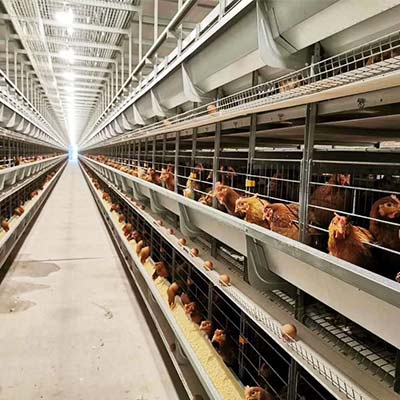How to disinfect chicken houses with poultry cage systems more scientifically?
- font size decrease font size increase font size
In the process of raising egg broilers, chicken disinfection is a work that every farmer must pay attention to. There will be pathogenic microorganisms in the chicken house of every farmer, especially when the weather is hot, it is a good period for the reproduction of microorganisms, which will directly affect the health of the chickens. Therefore, reasonable and effective disinfection can provide a hygienic growth and production environment for chickens and reduce the disease rate of chickens. So how can farmers disinfect to be more scientific and effective?

- Clean the chicken house before disinfection: Before carrying out disinfection with chickens, farmers should pay attention to the need to thoroughly clean the roof, walls, chicken coop passages, and dust and other pollutants on the automated chicken raising equipment. In order to improve the disinfection effect and save the amount of medicine.
- Select high-quality disinfection drugs: When selecting disinfection drugs with chicken disinfection, farmers should pay attention to choosing broad-spectrum, high-efficiency, and strong bactericidal effects, but with low toxicity and irritation, no residue, and less corrosiveness to metal and plastic products. of disinfectant. Commonly used disinfection drugs in the chicken industry include Baidu, Baijie, peracetic acid, sodium hypochlorite, Xinjieermin, etc. The farmers can choose according to their actual situation and local varieties.
- Scientific preparation of disinfectants: When preparing disinfectants, farmers should pay attention to choosing deep well water or tap water with less impurities, and pay attention to controlling the water temperature at about 30-45°C. Another very important point is that the stability of the disinfectant becomes poor after dilution with the medicinal water, so farmers must prepare and use it immediately, and use it up once, and the prepared disinfectant cannot be stored.
- Selection of disinfection equipment and correct spraying: When choosing disinfection equipment, poultry equipment manufacturers suggest that farmers can choose high-pressure power sprayers or knapsack sprayers. When spraying, they should be sprayed in a circle above the chicken house. The diameter of the mist particles is 80 to 120 microns. If the mist particles are too small, it is easy to be inhaled into the respiratory tract by chickens, causing pulmonary edema, and may also induce respiratory diseases in severe cases; but if the mist particles are too large, it is easy to cause uneven spray and increase the humidity of the chicken house.
- Master the frequency and amount of spray disinfection: Under normal circumstances, it is recommended that farmers can choose to bring chickens to disinfect 2 to 3 times a week for their chicken houses. Farmers should not carry out spray disinfection with chickens during the brooding stage, but they can carry out disinfection with chickens after 1 week of age. However, it should be noted that the general spray amount is calculated at 30-50 ml per square meter, the amount of spray for chicks is less, and the amount of spray for medium and large chickens is more.
In addition, poultry equipment manufacturers remind farmers that they should also pay attention to the following issues. If the chickens are vaccinated, the farmers cannot carry out disinfection with the chickens within 3 days before and after, so as not to affect the immune effect. After the chickens are disinfected, the ventilation of the chicken house should be strengthened, so as to facilitate the drying of the surface of the chicken flock and the chicken house.

